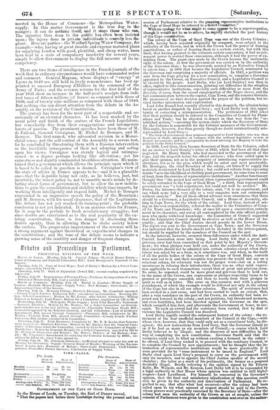There are two items of intelligence in the French journals
of the week that in ordinary circumstances would have commanded notice and comment. General Magnan, whose displays of " energy " at Lyons in 1849 are still held in lively remembrance, has been ap- pointed to succeed Baraguay d'Hilliers in the command of the Army of Paris ; and the revenue returns for the first half of the year 1851 show an increase in the half-year's receipts from indi- rect taxes of fifteen millions (of francs) as compared with those of 1850, and of twenty-nine millions as compared with those of 1849. But nothing else can divert attention from the debate in the As- sembly on the revision of the Constitution.
The oratory has been for the most part of a respectable and oc- casionally of an elevated character. It has been marked by the usual point and finish of the orators of the French Legislature, but remarkably free from their exaggerations and intemperate bursts of passion. The prominent speeches have been those of M. de Falloux, General Cavaignac, M. Michel de Bourges, and M. Berryer. The first-named, who advocated revision in a Monar- chical sense, put the self-control of the Assembly to a severe test, for he concluded by threatening them with a Russian intervention as the inevitable consequence of their not adopting and acting upon his views. Cavaignac was sternly logical and unimpas- sioned—to a degree perhaps looking like affectation ; yet his earnestness and dignity commanded breathless attention. He main- tained that a government which allows the principle upon which it is based to be called in question is doomed. Cavaignac's view of the state of affairs in France appears to be—and it is a plausible one—that the Republic being not only, as he believes, just, but inevitable, the wisest policy is, not to unsettle men's minds by de- bating about forms of government, but to allow the new institu- tions to gain the consolidation and stability which time imparts, by working them intelligently and in good faith. Michel de Bourges expounded in an impressive speech the policy of the Mountain; and M. Berryer, with his usual eloquence, that of the Legitimists. The debate has not yet reached its turning-point ; the probable conclusion is not yet indicated. It is an anxious crisis for France, for it may be the prelude to fresh revolutionary struggles ; but suice doubts are entertained as to the real popularity of the ex- isting constitution, there is less danger in discussing those doubts openly, than in allowing them to shake society below the surface. The progressive improvement of the revenue will be a strong argument against theoretical or experimental changes in the constitution; and the tone of the debate seems to indicate a growing sense of the inutility and danger of frequent changes.


























 Previous page
Previous page